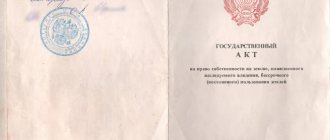Basic legal provisions
The law of the Russian Federation provides that a citizen has the right to dispose of his property, and also has the full right to acquire land and further use it. All main aspects are prescribed in the Land Code of the Russian Federation.
The Constitution of the Russian Federation (fundamental law) also stipulates the rights of all citizens to dispose of their property:
- everyone has the right to own a plot of land;
- the owner of the land can dispose of it within the framework established by the legislation of the Russian Federation. His actions must not violate the laws of the site or third parties.
- The conditions and procedure for using a land plot are directly prescribed by law.
All legal acts must not contradict the main law - the Constitution.
This principle is also observed in the procedure for eliminating a citizen’s rights to land plots. The basic rules are stated directly in the Land Code and have the following procedure:
- the right to own a land plot is terminated at the will of its owner;
- ownership can be forcibly terminated if the owner has violated laws;
- liquidation methods are prescribed in the Civil and Land Codes, as well as in the Federal Laws of the Russian Federation.
- Ownership of land plots may be revoked.
The Land Code of the Russian Federation does not establish grounds for the forced termination of property rights due to the commission of land offenses, due to improper use of a land plot, but is limited to a reference to civil legislation, according to which the grounds for forced
termination of the right of private ownership of land plots are:
1) foreclosure of a land plot for the obligations of the debtor
– the owner of a land plot, which is permitted only on the basis of a court decision (Article 278 of the Civil Code of the Russian Federation);
2) failure to use a land plot in accordance with its intended purpose
(Article 284 of the Civil Code of the Russian Federation);
3) use of land in violation of the law
(Articles 285, 286 of the Civil Code of the Russian Federation, Article 54 of the Land Code of the Russian Federation).
Non-use or use in violation of land legislation is considered by the legislator as a significant violation by the owner of his obligations to use the land owned by him (Article 42 of the Land Code of the Russian Federation) and as a basis for the forced termination of ownership of the land plot.
The Land Code of the Russian Federation describes the procedure for terminating the rights of persons who are not owners of land plots in case of improper use (Article 54);
4) requisition
land plot, used in cases of natural disasters, accidents, epidemics, epizootics and other circumstances of an emergency nature, in order to protect the vital interests of citizens, society and the state from threats arising in connection with these emergency circumstances. The decision on requisition is made by the authorized executive body of state power.
Requisition does not mean the seizure of a land plot, including redemption, for state or municipal needs;
5) purchase of land for state or municipal needs.
The redemption is carried out by the Russian Federation, constituent entities of the Russian Federation or municipalities, depending on for whose needs the land plot is withdrawn;
6) alienation of a land plot that, according to the law, cannot belong to a given person.
Such termination of ownership rights applies when the property is in the ownership of a person on grounds permitted by law, but cannot belong to him by force of law;
7) nationalization of land
those. the conversion into state ownership of lands owned by citizens and legal entities is carried out on the basis of law with compensation for the value of this property and other losses.
Table of contents
Grounds for termination of land rights
What are the grounds for termination of ownership of land?
- On a voluntary basis. In this case, the owner of the land himself wants to terminate the ownership of the land and transfer it to another person. Usually the owner sells the land, rents it out or donates it. A citizen can also voluntarily renounce ownership of a plot of land in favor of a third party or the state.
- Forced liquidation of ownership rights to a plot of land. In this case, a citizen is deprived of property rights without his consent or taking into account his opinion. The grounds on which forced liquidation is possible are prescribed by the law of the Russian Federation.
Refusal of the owner's right of ownership of the plot
In order to legally carry out a voluntary renunciation of a land plot, the owner of the land should submit an appropriate application, which will outline the desire. Such a document must be submitted to a government agency that carries out state registration of rights to any real estate and controls the conduct of any real estate transactions.
If the procedure is fully followed, ownership of a specific plot will be completely terminated from the moment of state registration of the fact of termination of ownership of the plot. In order for an executive or judicial body to make a decision to terminate ownership of any land plot, the land owner should submit the following package of documents to the state or municipal body:
- a statement expressing the renunciation of ownership rights to a specific plot;
- a copy of documents confirming the identity of the applicant or the fact of state registration of a legal entity in a special register;
- cadastral passport of a plot of land, if the state land cadastre contains data on a specific plot;
- if the owner has documents that confirm ownership of the site;
- if there are no documents on ownership of the plot, then you need to provide documents that indicate the provision of the land plot by a municipal or state body.
Nuances of voluntary alienation of rights to a land plot
On a voluntary basis, the owner of the land usually enters into some kind of transaction: sale of property, donation, lease, inheritance.
To formalize this alienation, you need to draw up a written agreement and register the transfer of ownership rights. Thus, on a voluntary basis, abandonment of a land plot occurs in two stages:
- Concluding a deal with the new owner. The parties discuss all the nuances, come to a general agreement, and record all their rights and obligations in the contract. The parties may use the services of a lawyer or notary.
- Registration of property rights with the authorized body. After concluding the contract, the parties are required to contact local authorities to carry out the procedure for registering property rights for the new owner. This procedure can be carried out both in Rosreestr and in the MFC (Multifunctional Center).
Realtor ABC: Forced and voluntary termination of land rights
- According to Art. 44 of the Land Code of the Russian Federation, rights to a land plot are terminated in two ways: voluntary termination of rights to a land plot;
- forced termination of rights to a land plot.
- contract of sale;
The procedure for concluding a purchase and sale agreement is regulated by Art.
549-558 of the Civil Code of the Russian Federation and Art. 37 of the Land Code of the Russian Federation. You can sell a land plot that has undergone state cadastral registration in accordance with the Federal Law “On the State Land Cadastre” and state registration in accordance with the Federal Law “On State Registration of Rights to Real Estate and Transactions with It.” The sale of a land plot can be completed both simultaneously with the sale of buildings, structures and structures located on the land plot, and without their sale. If the purchase and sale agreement for buildings, structures and structures does not specify the right to the land plot transferred to the buyer (ownership or lease), the buyer of the buildings, structures and structures receives the right of ownership to that part of the land plot that is occupied by these buildings, structures and structures and is necessary for their use (usually at least 1.5-2.0 m from the wall). The procedure for concluding an exchange agreement is regulated by Art. 567-571 of the Civil Code of the Russian Federation. The rules of purchase and sale applicable to the accounting and registration of a land plot apply to the exchange agreement. Under an exchange agreement, it is allowed to exchange a land plot both for another land plot and for other real estate. If, under an exchange agreement, the real estate being exchanged is recognized as unequal in value, then the parties must pay the difference in prices.
The procedure for making a land plot as a contribution to the joint (authorized, share) capital (fund) of a business partnership, company, cooperative is regulated by Art. 66, 70, 83, 89, 90, 95, 99, 100, 108, 109, 116 of the Civil Code of the Russian Federation.
Contribution of a land plot as a contribution to the joint (authorized, share) capital (fund) entails the transfer of ownership of it to a legal entity.
The procedure for concluding a gift agreement is regulated by Art. 572-582 of the Civil Code of the Russian Federation. You can donate a plot of land to any citizen, legal entity, municipality, constituent entity of the Russian Federation and the Russian Federation. You can donate (donate a plot of land for general beneficial purposes) to any citizen, medical, educational institution, social security institution and other similar institutions, charitable, scientific and educational institutions, foundations, museums and other cultural institutions, public and religious organizations, as well as the state, subjects of the Russian Federation and municipalities. The recipient has the right to refuse the gift at any time before the land plot is transferred to him. In this case, the gift agreement is considered terminated, but if it has undergone state registration, then the refusal of the gift is also subject to state registration. The presence of counter obligations or conditions makes the gift agreement invalid. The main condition of the gift agreement is the gratuitousness of the gift.
The procedure for voluntary refusal to exercise ownership of a land plot is regulated by Art. 225 and 236 of the Civil Code of the Russian Federation, and from the right of lifelong inheritable possession and from the right of permanent (perpetual) use - clause 3 of Art. 53 of the Land Code of the Russian Federation.
If a citizen submits an application for refusal to exercise his ownership right to a land plot, then such a plot is accepted for registration by the registration chamber of the Ministry of Justice of Russia and after 1 year from the date of registration of the land plot, the local government body can apply to the court with a demand for recognition of the right municipal ownership of this land plot. If a citizen renounces the right of lifelong inheritable possession or the right of permanent (indefinite) use, the authority that provided the citizen with this land plot has the right to immediately decide to confiscate the land plot from the renouncing citizen, enroll the land plot in the land redistribution fund, or provide the land plot other citizens.
The procedure for concluding a permanent annuity agreement, a life annuity agreement and a lifelong maintenance agreement with dependents is regulated by Art. 583-605 of the Civil Code of the Russian Federation. Under a permanent rent agreement, one party (rent recipient) transfers ownership of a land plot to the other party (rent payer), and the permanent rent payer undertakes, in exchange for the received land plot, to periodically (once a quarter) pay rent in the form of a sum of money, provision of things, performance works or services corresponding in value to the monetary amount of annuity specified in the contract until the entire amount specified in the permanent annuity contract is paid. Payment of life annuity is established for the life of the citizen who transferred the land plot for payment of rent or for the life of another citizen indicated by him, and the amount of life annuity per month must be no less than the minimum wage established by law. When concluding a lifelong maintenance agreement with a dependent, the annuity payer assumes the obligation to provide lifelong maintenance with the dependent of the citizen who transferred the land plot and (or) another citizen indicated by him (providing for the needs of housing, food and clothing, caring for the citizen and even paying for funeral services) .
Inheritance of a land plot is regulated by Art. 1110-1175, 1182 and 1183 of the Civil Code of the Russian Federation. Inheritance is carried out by will (the testator, at his own discretion, bequeaths property to any persons, determines the shares of heirs in the inheritance in any way, deprives one, several or all of his heirs of inheritance) or by law (in cases where there is no will). Heirs by law are called upon to inherit in the order of priority provided for in Articles 1142-1145, 1148 of the Civil Code of the Russian Federation (7 queues). Land plots that belong to the testator by right of ownership or by the right of lifelong inheritable ownership are inherited (Article 1181 of the Civil Code of the Russian Federation).
It must be borne in mind that, in accordance with Art. 21 of the Land Code of the Russian Federation, an heir who has received by inheritance the right to lifelong inheritable ownership of a land plot can acquire this land plot as his own free of charge. An undeveloped land plot held by a citizen with the right of permanent (perpetual) use is not inherited either by will or by law. It is advisable for such citizens in accordance with Art. 20 of the Land Code of the Russian Federation to acquire such land plots into ownership, given that this is allowed to be done free of charge. Heirs no longer have the right to free privatization.
Rights to a land plot are forcibly terminated in the following cases:
- seizures, including through redemption, for state and municipal needs;
- confiscation of land;
- requisition of land;
- improper use of land.
For the first time, the concept of what is considered state and municipal needs appeared in Art. 49 of the Land Code of the Russian Federation. These include exceptional cases related to the fulfillment of Russia’s international obligations, the location of objects of state or municipal importance in the absence of other options for their possible location, and other circumstances directly established by federal laws and laws of constituent entities of the Russian Federation. Such circumstances include cases related to ensuring the defense and security of the state, the development of mineral deposits, the creation of cultural heritage sites of the Russian Federation, the construction and maintenance of cultural, social, educational facilities, highways, main pipelines, power lines, communications and other similar structures in the absence of other options for their possible placement (clause 3 of Article 79 of the Land Code of the Russian Federation), cases related to development in urban and rural settlements in accordance with the master plans of these settlements, land use and development rules (clause 3 of Art. 83 of the Land Code of the Russian Federation), cases related to the creation and expansion of state nature reserves, reserves, natural monuments, national parks, botanical gardens, territories of traditional nature management of indigenous peoples, health resorts and resorts (clause 5 of Article 95 of the Land Code RF).
The procedure and conditions for the seizure, including through redemption, of land plots for state and municipal needs are regulated by Art. 279, 281 and 283 of the Civil Code of the Russian Federation, Art. 55, 62 and 63 of the Land Code of the Russian Federation. Depending on whose needs the land plot is being withdrawn (purchased), the decision is made by the Russian Federation, a constituent entity of the Russian Federation or a municipal entity no later than a year before the upcoming withdrawal (buyout). At the request of a citizen from whom a land plot is confiscated (purchased), he is provided with an equivalent land plot in return, the cost of residential, industrial and other buildings, structures and structures located on the confiscated (purchased) land plot is reimbursed, losses are fully compensated, including including lost profits, and the owner of the land plot also the market value of the land plot.
The procedure for confiscation of a land plot (free confiscation from its owner by a court decision in the form of a sanction for a crime committed) is regulated by Art. 243 Civil Code of the Russian Federation, Art. 50 Land Code of the Russian Federation, Art. 44, 45, 52 and 73 of the Criminal Code of the Russian Federation and Art. 63 of the Criminal Executive Code of the Russian Federation. Confiscation was used until 2005 only as an additional form of punishment; it was not imposed upon suspended sentence. Land plots on which a house and outbuildings not subject to confiscation are located, as well as land plots necessary for conducting agriculture or subsidiary farming, were not subject to confiscation.
However, in 2004, the rules establishing cases of confiscation of property were excluded from the Criminal Code and the Criminal Executive Code, and therefore, at present, confiscation is essentially a declarative norm of the Civil and Land Codes without any consequences.
The procedure for requisitioning a land plot (temporary seizure by an authorized executive body of state power in order to protect citizens, society and the state from threats of emergency circumstances (natural disaster, accident, epidemic, etc.) with compensation to the owner of the land plot for losses caused) is regulated by Art. 242 of the Civil Code of the Russian Federation and Art. 51 of the Land Code of the Russian Federation. If it is impossible to return the requisitioned land plot, its owner is reimbursed the market value of the land plot or is provided with an equivalent land plot.
The procedure for forced termination of rights to a land plot due to its improper use is regulated by Art. 237, 238, 240, 252, 273, 284 and 285 of the Civil Code of the Russian Federation, art. 44-48, 54 of the Land Code of the Russian Federation and Art. 6 of the Federal Law “On the Turnover of Agricultural Land”.
The grounds for forced termination of rights to a land plot due to its improper use are:
- use of the land plot not in accordance with its intended purpose;
- not using the land plot for its intended purpose for agricultural production or housing or other construction for three years;
- use of land in ways that lead to a significant decrease in the fertility of agricultural land or significant deterioration of the environmental situation;
- failure to eliminate intentionally committed land offenses (pollution, damage or destruction of fertile soil, violation of the established regime of lands in specially protected natural areas, lands for environmental protection, recreational purposes, lands for historical and cultural purposes);
- systematic failure to implement mandatory measures to improve land, protect soils from wind erosion and prevent other processes that worsen the condition of soils;
- systematic failure to pay land tax (for two or more years in a row).
Forced termination of rights to a land plot due to its improper use is carried out subject to the failure to eliminate the facts of improper use after the imposition of an administrative penalty in the form of a fine. The amount of penalties is established in Art. 7.1, 7.2, 7.10, 7.18, 8.3, 8.6, 8.7, 8.8, 9.4, 9.5, 10.1-10.14 of the Code of Administrative Offenses of the Russian Federation. Forced termination of rights to a land plot is carried out by a court decision upon the application of a government body of a constituent entity of the Russian Federation or a local government body.
Author: N.I. Kalinin
To receive advice on legalization issues, land legal issues and issues of country real estate, you can contact the land legal department of the EXPERT office in Ufa, on Pr. October 11, tel.
Network of Real Estate Agencies "EXPERT"
Nuances of forced termination of rights
The second way to liquidate the right of ownership of land is the forced termination of the owner’s rights to it. In what cases does the state have grounds to terminate land ownership?
- If the owner damages his property.
- If the state alienates a land plot for the needs of the municipality;
- Requisition – in case it is necessary to remove a land plot from safety with subsequent compensation;
- The state has the right to take land if it does not belong to the citizen;
- The government can confiscate land for violations.
Nuances of foreclosure
The state has the right to confiscate land with subsequent compensation. In this case, liquidation occurs on the basis of regulatory legal acts. The state cannot seize land plots within the city for development. The authorities are obliged to warn the owner at least one year before the seizure procedure. This decision must be registered with Rosreestr and provide that the owner of the land plot retains all his rights until compensation. The state can also buy land at market value. It is important to note that all buildings located on the territory of this site must also be paid for by the municipality.
When determining the value of a plot, it is necessary to contact specialists to evaluate the property. The owner may disagree with the decision of the authorities and file an application in court.
Procedure for terminating ownership of a land plot
The procedure for terminating ownership rights to a land plot depends on the rights under which it is carried out:
- on a reimbursable basis;
- free of charge;
- in case of negligence and ignoring warnings.
In case of compensation
In this case, the procedure for land acquisition will be carried out on the basis of the following documents:
- an act of seizure of this site, which will be decided by a government agency;
- the court's decision;
- municipal order.
In this case, the owner will be offered either a buyout or compensation for the seizure of the land by others.
When free of charge
If ownership of a land plot is terminated free of charge, the municipality or local administration is required to draw up an act that will spell out the reasons for the seizure of this land. The reasons may be:
- damaging the land;
- disturbance of the surrounding landscape;
- non-compliance with land use regulations;
- violation of legislative aspects;
- other.
Forced seizure of land
State or municipal bodies have the legal right and ability to forcibly withdraw land from the personal possession of individuals. Such a process is possible if the owner of the plot has not entered into a voluntary agreement to seize the land or he does not agree with such a court decision. In this case, the law provides for forced seizure of property.
Seizure of plots is possible only upon a court decision. A legal claim is filed with the judicial authorities during the entire period of validity of the decision to seize the land, however, this document cannot be filed with the court earlier than three months from the date the land owner receives such a draft future agreement for the seizure.
A package of documents is requested from the owner if the necessary papers are not at the disposal of the executive body or the available data is insufficient to make a decision on forced seizure.
Thus, termination of ownership of land plots is possible voluntarily or compulsorily, subject to the availability of appropriate documentation or court decisions.







